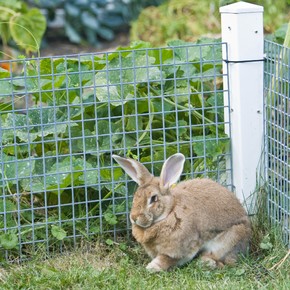Spring is a wonderful time for rabbits and their owners alike. As the weather warms up, many pet rabbits get to spend more time outdoors, enjoying fresh air and exploring the garden. With all the new green growth, it’s natural to wonder what’s safe for your bunny to nibble on. If you’re asking “Can Pet Rabbits Eat Clover?”, you’re in the right place. Clover often pops up in lawns and gardens, and thankfully, in moderation, clover can be a safe and even beneficial treat for your pet rabbit.
 Rabbit in garden
Rabbit in garden
Is Clover Safe for Rabbits?
Yes, clover is generally considered safe for rabbits to eat. In fact, many rabbits enjoy the taste of clover, and it can be a healthy addition to their diet in small amounts. Clover, whether it’s red or white clover, is not toxic to rabbits and can offer some nutritional benefits. However, like many foods, moderation is key. A diet consisting solely of clover would not be balanced and could lead to health issues.
The Nutritional Benefits of Clover for Rabbits
Clover offers some nutritional advantages for rabbits when fed as part of a varied diet:
- Fiber: Clover provides dietary fiber, which is essential for a rabbit’s digestive health. Fiber helps to keep their gut moving properly and prevents issues like GI stasis, a serious and potentially life-threatening condition in rabbits.
- Vitamins and Minerals: Clover contains vitamins and minerals, including Vitamin C and calcium, which contribute to overall health.
- Palatability: Many rabbits find clover very palatable, which can make it a useful way to encourage eating, especially for picky eaters or when introducing new foods.
- Hydration: Fresh clover has a high water content, which can contribute to your rabbit’s daily fluid intake, supporting hydration.
Potential Risks of Feeding Clover to Rabbits
While clover is safe in moderation, overfeeding or improper introduction can lead to some risks:
- Bloat: Like other fresh greens, excessive amounts of clover can potentially cause bloat in rabbits due to its fermentation in the gut. Bloat is a painful condition caused by gas buildup in the digestive system.
- Pesticides and Herbicides: Clover growing in lawns or public spaces may be treated with pesticides or herbicides, which are toxic to rabbits. Only feed clover from areas you know are free from harmful chemicals.
- Nutritional Imbalance: Relying too heavily on clover can lead to a nutritional imbalance. Rabbits need a diet primarily composed of hay, supplemented with a smaller amount of pellets and fresh vegetables.
- Sudden Dietary Changes: Introducing large quantities of clover suddenly can upset your rabbit’s digestive system, leading to diarrhea or other issues. Any new food should be introduced gradually.
How to Safely Introduce Clover to Your Rabbit’s Diet
To safely offer clover to your rabbit, follow these guidelines:
- Start Slowly: Introduce clover gradually, beginning with a small amount, such as a few sprigs. Observe your rabbit’s droppings for any changes, like soft stools, which could indicate digestive upset.
- Moderation is Key: Clover should be considered a treat and not a staple food. Offer it in small quantities as part of a varied diet. A handful a few times a week is generally sufficient.
- Wash Thoroughly: Always wash clover thoroughly to remove any dirt, debris, or potential contaminants, even if you are confident it’s from a pesticide-free area.
- Source Carefully: Ideally, pick clover from your own garden if you don’t use chemicals. Avoid clover from roadsides or public parks where it may have been sprayed or contaminated.
- Variety is Important: Don’t just rely on clover. Offer a variety of safe greens and vegetables alongside a diet rich in hay to ensure your rabbit gets a balanced range of nutrients.
Other Safe Plants for Rabbits in Your Garden
Besides clover, there are many other plants that are safe for rabbits to enjoy in your garden. Expanding the variety of safe plants can provide enrichment and nutritional diversity. Some safe options include:
- Dandelions: Leaves, flowers, and roots are all safe and nutritious.
- Plantain: Another common “weed” that is safe and enjoyed by rabbits.
- Chamomile: Both fresh and dried chamomile can be given in moderation.
- Basil, Mint, Parsley, Cilantro (Coriander): These herbs can be offered in small amounts as tasty treats.
- Rose petals and leaves (unsprayed): A fragrant and safe treat.
- Calendula (Pot Marigold): Flowers and leaves are safe.
However, remember that some garden plants are toxic to rabbits. It’s crucial to avoid plants like:
- Buttercups
- Daffodils
- Foxglove
- Rhubarb leaves
- Azaleas
- Deadly Nightshade
If you are unsure about a plant’s safety, it’s always best to err on the side of caution and avoid feeding it to your rabbit.
Conclusion
In conclusion, pet rabbits can eat clover safely in moderation. It can even offer some nutritional benefits and add variety to their diet. However, it’s crucial to introduce clover gradually, feed it in small quantities, and ensure it is free from pesticides and contaminants. Always prioritize a diet that is primarily composed of hay, supplemented with a balanced array of safe vegetables and a limited amount of high-quality rabbit pellets. If you have any concerns about your rabbit’s diet or suspect they have eaten something toxic, always consult with a veterinarian experienced in rabbit care for tailored advice. Enjoying the garden with your bunny can be a joy, just ensure it’s a safe and healthy experience for them!

